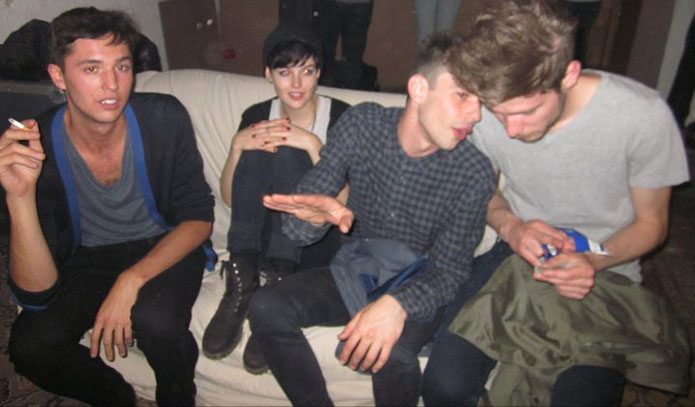Bicultural Urbanite Luke
Becoming Germanian

When I first got to Berlin I developed something of an infatuation with 'Zee Germans'. Compared to Australians, everything about German people seemed so endearingly serious and neat.
I was charmed by the way they spoke—slowly and deliberately, with a careful consideration of the facts and without that inane flow of pleasantries that defines much of Americanised English in inner-city Melbourne. No superficial drivelling of “omgs!” or overblown compliments. The words “like”, “so”, and “totally” were like so totally absent from the Germans’ vernacular. I even found the lilting intonation of the accent soothing.
For a long time I unconsciously avoided other expats—fellow Australians were given an especially cold shoulder—and went about the business of befriending as many Germans as humanly possible. When I met young Berliners out and about, I was impressed by how mature and switched-on they seemed in contrast to the average 20-year-old in Melbourne. Coming from a culture where beating around the bush is less an idiom than a way of life, the blatant directness of the German inquisition was a breath of fresh air. There was a kind of cool candour to the way they handled social interactions that seemed to ooze refinement.
Eager to shed cultural shackles
I observed with admiration how even tiny German children made their way around the streets respectfully; entirely unchaperoned, bopping along conscientiously from school to home with their little backpacks like miniature adults. This would simply never happen in metropolitan Melbourne, where kids are typically car-pooled from block to block and generally mollycoddled well into adolescence. But here, the whole thing seemed to go off without a hitch. I was eager to shed the cultural shackles of my crude Aussie beginnings and pledge allegiance to this sophisticated society of earnest characters. Mingling with the Germans in my early Berlin days.
| © Tsari Paxton
Of course, the honeymoon can’t last forever. At some point while getting properly settled, possibly during one of a great many infuriating arguments with one of a great many infuriating bureaucrats, or perhaps during the fifth-hundredth time a random German person made the same hilarious Star Wars joke when they learned my name was Luke, the penny dropped. And with it went the rose-tinted glasses.
Mingling with the Germans in my early Berlin days.
| © Tsari Paxton
Of course, the honeymoon can’t last forever. At some point while getting properly settled, possibly during one of a great many infuriating arguments with one of a great many infuriating bureaucrats, or perhaps during the fifth-hundredth time a random German person made the same hilarious Star Wars joke when they learned my name was Luke, the penny dropped. And with it went the rose-tinted glasses.
A human approach to bureaucracy
And so began the emergence of a much soberer view—not only of Germans in Berlin, but also of Australians back home. Skip forwards many years and there are a lot things I’ve come to appreciate and miss about Australians. I miss the relaxed, genial way strangers relate to one another; the more flexible, human approach to bureaucracy (instead of the blind following of a predetermined set of rules that seemingly exists purely for the sake of rules); I miss that when you spend your hard-earned cash on a service, you’re treated politely as a valued customer, even if that courtesy is entirely superficial (yes, that’s the nature of the transaction in a service and it's nice).But most of all, I miss the Australian humour. I miss the bounce of sardonic wit, the acerbic flow of banter; the inherent appreciation of the subtleties of irony and the understanding of my jokes without explanation. While a uniform seriousness and earnestness may be a blessing in many societal situations, apparently it can also come at a price. In short, it took me many years to realise it, but all those things that bother me about Australians often have their positive flip sides, too. What’s more, deep down they will always be a part of me, whether I like it or not.
I guess the moral of the story is that all national and cultural identities have their pros and cons. No one model of society is perfect, and we could all do with borrowing from each other’s approaches to critique and enrich our ways of living. I’ll never fit in perfectly in Germany, but when I return to Australia nowadays people tell me I speak strangely, I’m disappointed when my water isn’t sparkling, and I get really uncomfortable when someone I just met at a party starts fawning over how totally amazing my plain white t-shirt is. No longer completely Australian, but far from being German, I guess maybe I’m becoming Germanian. And maybe that’s not such a bad compromise.